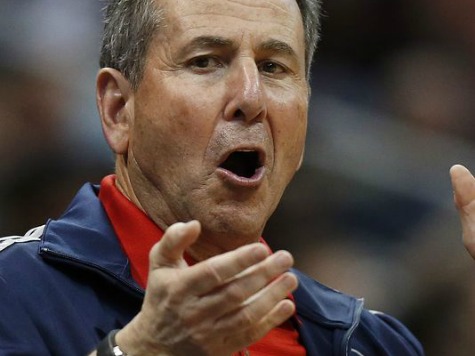On Monday, former Los Angeles Lakers great Kareem Abdul-Jabbar defended Atlanta Hawks owner Bruce Levenson, arguing that he is not a racist like Donald Sterling and should not have been so quick to decide to sell his team over an “offensive” email (read Levenson’s full e-mail here).
Over the weekend, Levenson announced that he would sell his interest in the team after he reported an email from 2012 in which he suggests that white fans are not showing up to Hawks games because they may be scared of black fans, a sentiment Levenson himself said was unwarranted in the email.
Abdul-Jabbar wrote in Time that the “questions about how to attract more white fans were entirely reasonable” and the “only problem is that Atlanta Hawks controlling owner Bruce Levenson is no Donald Sterling. Nor is his email racist. In fact, his worst crime is misguided white guilt”:
I read Levenson’s email. Here’s what I concluded: Levenson is a businessman asking reasonable questions about how to put customers in seats. In the email, addressed to Hawks President Danny Ferry, Levenson wonders whether (according to his observations) the emphasis on hip-hop and gospel music, the fact that the cheerleaders are black, the bars are filled with 90 percent blacks, kiss-cams focus on black fans, and timeout contestants are always black has an effect on keeping away white fans.
Seems reasonable to ask those questions. If his arena was filled mostly with whites and he wanted to attract blacks, wouldn’t he be asking how they could de-emphasize white culture and bias toward white contestants and cheerleaders? Don’t you think every corporation in America that is trying to attract a more diverse customer base is discussing how to feature more blacks or Asians or Latinos in their TV ads?
He said though “there are a few assumptions he makes that make me cringe a little” in the email, Levenson, to his credit, “dismisses fans who complained about the arena’s site as being code for racist fear that ‘there are too many blacks at the games.’ He further decries the white perception that even though the percentage of blacks in attendance had lessened, that they still feel it’s higher and therefore somehow threatening. His outrage seems authentic.”
Abdul-Jabbar continues by noting that he was upset that Levenson was too quick to blame himself for sending the message “that our white fans are more valuable than our black fans” when that is not what, according to Abdul-Jabbar, the email said:
Business people should have the right to wonder how to appeal to diverse groups in order to increase business. They should even be able to make minor insensitive gaffs if there is no obvious animosity or racist intent. This is a business email that is pretty harmless in terms of insulting anyone — and pretty fascinating in terms of seeing how the business of running a team really works.
The thing that makes me mad is that Levenson was too quick to rend his clothing and shout mea culpa. In his apology, he wrote: “By focusing on race, I also sent the unintentional and hurtful message that our white fans are more valuable than our black fans.” But that’s not the message in the email at all. If the seats had all been filled, even if all by blacks, the email wouldn’t have been written. He wasn’t valuing white fans over blacks, he was trying to figure out a way to change what he thought was the white perception in Atlanta so he could sell more tickets. That’s his job.
Abdul-Jabbar, though, fears that the media will gin up more unwarranted racial hysteria over the email.
“Well, the pitchforks are already sharpened and the torches lit anyway, so rather than let them go to waste why not drag another so-called racist before the Court of Public Opinion and see how much ratings-grabbing, head-shaking, race-shaming we can squeeze out of it,” Abdul-Jabbar laments. “After all, the media got so much gleeful, hand-wringing mileage out of Don Sterling and Michael Brown.”

COMMENTS
Please let us know if you're having issues with commenting.